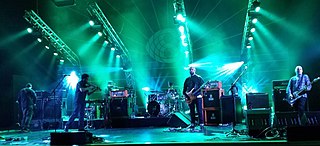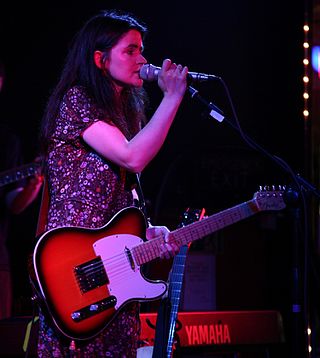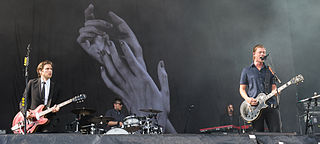
Tears for Fears are an English pop rock band formed in Bath, Somerset, in 1981 by Roland Orzabal and Curt Smith. Founded after the dissolution of their first band, the mod-influenced Graduate, Tears for Fears were associated with the new wave synthesizer bands of the early 1980s, and attained international chart success.

Bis are a Scottish indie pop band composed of Steven Clark, John Clark, and Amanda MacKinnon, formed in 1994. The band's name, rhyming with 'this', derives from "black iron skyline", a lyric from the song "Twilight of a Champion" by The The. After releasing numerous cult EPs and three studio albums the band broke up in 2003, but re-formed briefly in 2007 for a series of concerts. In 2009 they once again re-formed and released the album data Panik etcetera in 2014. The album Slight Disconnects was released in February 2019 with the band lineup returning to the original core three-piece. An archival album, Music For Animations, consisting of music recorded in 2004 for CBBC kids TV show BB3B, was released in 2020. In 2021 the band self-released a cassette-only live album entitled The Fan Club Tapes Vol. 1 - Live In Toulouse 1997. Low Level - a CD consisting of previously unreleased material recorded during the Return To Central sessions - was also released in 2021. In October 2022 Systems Music For Home Defence was released, which Sci-Fi Steven has described as the band's "rave" album.

Chemikal Underground is an independent record label set up in 1994 at Glasgow, Scotland by rock band The Delgados. It was set up to release their first single, "Monica Webster" / "Brand New Car" and went on to break many new Scottish bands in the nineties.

The Delgados are a Scottish indie rock band formed in Glasgow in 1994. The band is composed of Alun Woodward, Emma Pollock, Stewart Henderson, and Paul Savage (drums).
Arab Strap are a Scottish indie rock band whose core members are Aidan Moffat and Malcolm Middleton. The band were signed to independent record label Chemikal Underground, split in 2006 and reformed in 2016. The band signed to Rock Action Records in 2020.
Sluts of Trust are a two-piece rock outfit from Glasgow, Scotland, originally comprising John McFarlane and Anthony O'Donnell (drums). O'Donnell was later replaced on drums by Roo Harris.

Alexander Paul Kapranos Huntley is a Scottish musician, singer, songwriter, record producer and author. He is best known as the lead singer and guitarist of Scottish rock band Franz Ferdinand. He has also been a part of the supergroups FFS and BNQT.

Hate is the fourth studio album by Scottish rock band the Delgados. It was first released on 14 October 2002 by Mantra Records. Following the release of their third studio album The Great Eastern, the band performed music during an art show by Joe Coleman. It served as the catalyst for their next album, giving vocalist and guitarist Alun Woodward the urge to write more honest material. Recording was mainly held at CaVa Sound Studios in Glasgow, Scotland, with Dave Fridmann, Tony Doogan, and the band as producers. Additional recording was done at Chem19 Studios, also in Glasgow, and at Tarbox Road Studios in Cassadaga, New York. Described as an orchestral pop album, Hate continued the sound of The Great Eastern.

Mogwai are a Scottish post-rock band, formed in 1995 in Glasgow. The band consists of Stuart Braithwaite, Barry Burns, Dominic Aitchison, and Martin Bulloch (drums). Mogwai typically compose lengthy guitar-based instrumental pieces that feature dynamic contrast, melodic bass guitar lines, and heavy use of distortion and effects.
Mother and The Addicts were a Glasgow-based band signed to Chemikal Underground Records, who formed in 2003. They have released two albums.

Emma Pollock is a Scottish singer-songwriter, musician, and a founding member of the bands the Delgados and the Burns Unit. She is also one of the founders of The Fruit Tree Foundation project and a regular contributor to Vox Liminis.
Aereogramme were a Scottish alternative rock band from Glasgow, formed in 1998, consisting of Craig B., Iain Cook, Campbell McNeil (bass) and Martin Scott (drums). Prior to their split in 2007, the band released four studio albums.
Radar Bros. are an American indie rock band from Los Angeles, California, United States, formed in 1993 by Jim Putnam, Senon Williams (bass) and Steve Goodfriend (drums). They released their self-titled EP in 1995 on Fingerpaint Records. In 1996, they signed to Restless releasing a self-titled full-length record Radar Bros. the following spring.

The Great Eastern is the third studio album by Scottish indie rock band The Delgados. It was released on 17 April 2000 in the United Kingdom on their own Chemikal Underground record label, and later on 9 May 2000 in the United States.

The Last Romance is the sixth studio album by Scottish indie rock band Arab Strap, released on 17 October 2005 on Chemikal Underground.

De Rosa are a Scottish rock band from Bellshill. It consists of Martin Henry, Chris Connick (guitar), James Woodside (bass), Neil Woodside (drums) and Andrew Bush (piano/keyboards). The band have released three studio albums—Mend, Prevention, and Weem.

Checkmate Savage is the debut studio album by Scottish indie rock band The Phantom Band, released on 26 January 2009 through Chemikal Underground Records to critical acclaim.

The discography of American rock band Interpol consists of seven studio albums, seven extended plays (EPs), and fifteen singles. Interpol was formed in 1997 by New York University students Daniel Kessler and Greg Drudy, with Carlos Dengler and Paul Banks joining later. Drudy left the band in 2000, and was replaced with Sam Fogarino.

RM Hubbert, commonly known as Hubby, is a Scottish guitarist and singer. Best known for his solo work as RM Hubbert and as a member of Scottish post rock band El Hombre Trajeado, he has been an active member of the Glaswegian DIY music scene since 1991.

Come On Die Young is the second studio album by Scottish post-rock band Mogwai. The album was released on 29 March 1999 by Chemikal Underground.















